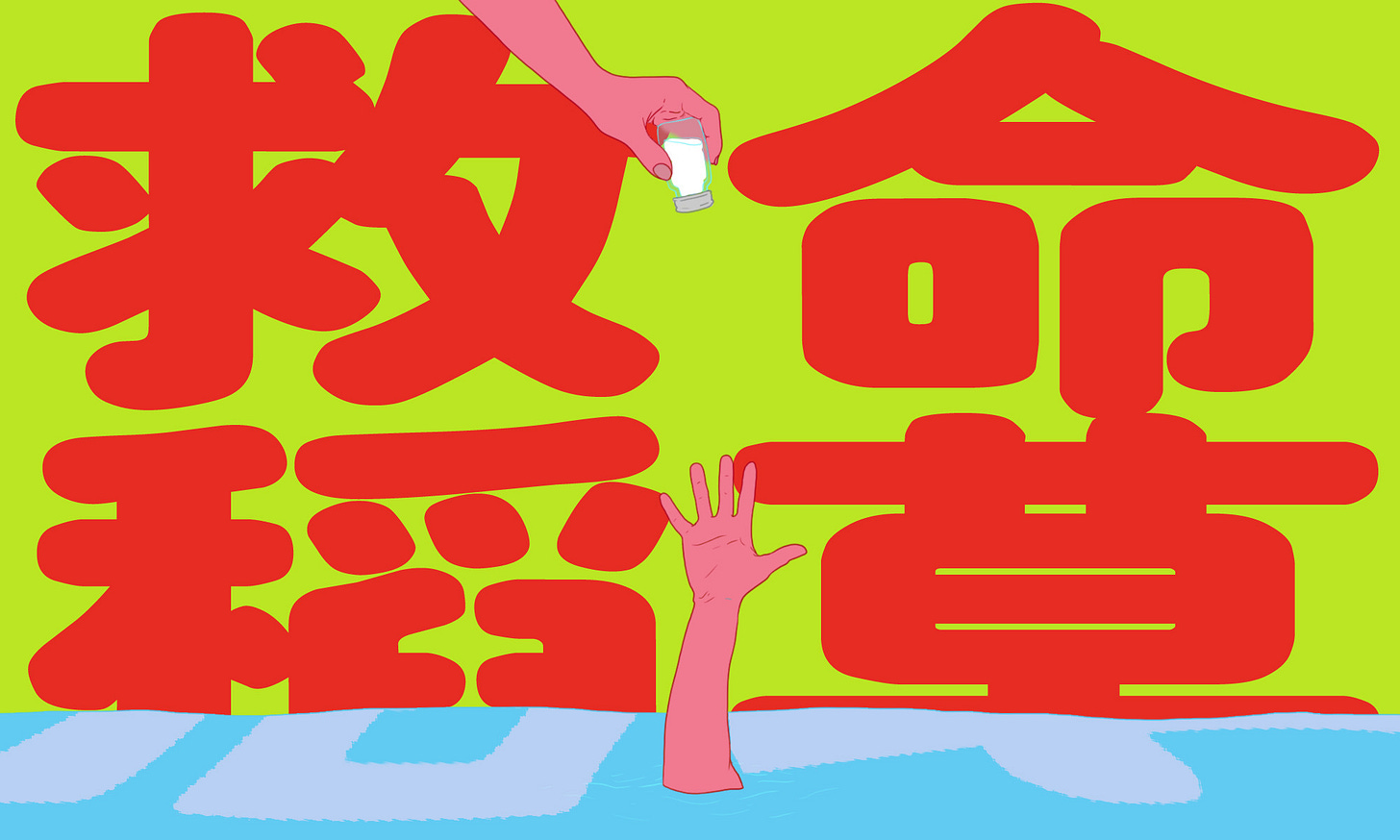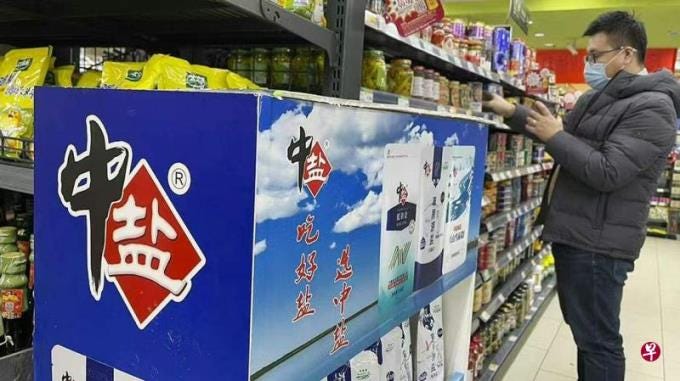Welcome to RealTime Mandarin—a multimedia resource to immerse you in the latest Chinese language trends, inspire you to practice and improve your Mandarin every week, and empower you to communicate with confidence.
Subscribe now to get the next issue straight to your inbox!
Consumers in China and other countries across Asia have fiercely objected to the controversial release of treated wastewater from the Fukushima nuclear power plant (福岛核电站 fú dǎo hé diàn zhàn), which began on 24 August.
A reminder of the background:
Japan's nuclear wastewater problem originated from the magnitude 9 earthquake that occurred on March 11, 2011. As the result of the super tsunami caused by the earthquake, seawater rushed directly into the reactor of the Fukushima Nuclear Power Plant on the Japanese coast, causing the nuclear power plant to suffer the most serious nuclear accident in history after the Chernobyl disaster in 1986. [4]
日本核废水问题源自2011年3月11日发生的九级大地震。地震引发的超级海啸让海水直接冲进了建在海岸边上的福岛核电站反应堆,导致该核电站发生了继1986年切尔诺贝利核事故后,史上最严重的核事故。 [4]
Panic buying salt (抢盐 qiǎng yán), hoarding it amid fears of future contamination, and a mistaken belief that iodized salt (加碘盐 jiā diǎn yán) can ward off the effects of radiation, has been seen across China.
It’s reminiscent of the panic buying when the nuclear disaster happened in 2011, following similar rumours circulating online.
China's stock markets have also been impacted by the panic:
Of course, these emotional fluctuations are both on- and offline. It is not just about grabbing salt in shops. In the past few days, stock investors are also "grabbing for salt" in the A-share market. Many salt industry stocks have continued to rise sharply. I always thought the stock market was sentimental before, but now it looks very sexy. [2]
当然,这种情绪波动交织于线上线下,不只是抢盐,这几天,股民们也在A股市场上“抢盐”,多只盐业股连续大涨。以前我总觉得股市感性,现在看起来十分性感。 [2]
China’s state-run National Salt Industry Corporation (中盐集团 zhōngyán jítuán), China’s and the world's biggest common salt maker, urged people (as it did in 2011) not to panic buy in a statement released on 25 August:
China’s table salt supply is 87% mine salt, 10% sea salt, and 3% lake salt. Salt mined from on land and lakes, which accounts for 90% of the total, is not affected by sea discharge.
我国食盐产品结构占比为井矿盐87%、海盐10%、湖盐3%。占比合计九成的井矿盐和湖盐,并不受排海行为影响。
Although it did help calm consumer concerns, an opinion piece in Singapore's largest Chinese language news outlet, Lianhe Zaobao 联合早报, suggests why some Chinese consumers were panic buying in the first place:
It is true that the Chinese government firmly opposes Japan’s discharge of nuclear wastewater into the sea, but there is a lack of scientific and systematic discussion, and the Chinese people have long been in an opaque and asymmetric information environment. They are more likely to be irrational when encountering such emergencies and controversies. Perhaps hoarding goods is the only practical measure they can take as a last desperate attempt to find security.
诚然,中国官方反对日本核废水排海的态度坚决,但缺乏科学和系统的论述,而中国民众又长期处于信息不透明和不对称中,在遇到突发事件和争议课题时,更容易失去理智陷入混乱,或许用实际行动囤货才是他们捍卫内心安全感的救命稻草。
Another factor is reflected in a colloquial phrase we have learned before in this newsletter:
开门七件事:“柴米油盐酱醋茶” kāi mén qī jiàn shì: chái mǐ yóu yán jiàng cù chá
There are seven necessities in life: Firewood, rice, oil, salt, soy sauce, vinegar, tea.
And, as always, there is creative word play with Chinese homophones:
大核民族 dà hé mín zú - "big nuclear people"
Which sounds the same as "the Japanese people" (大和民族 dà hé mín zú or Yamato minzoku)
盐荒子孙 yán huāng zǐ sūn - "salt lacking people"
Which sounds the same as "the Chinese people" (炎黄子孙 yán huáng zǐ sūn), a phrase meaning or “the descendants of Yandi and Huangdi” (the legendary ancestors of the Chinese people).
So, that's what we explore this week!
(A special thank you to Geremie R. Barmé, Editor of China Heritage, who kindly contributed some of the best phrases in this issue of the newsletter).
Favourite Five
1. 抢盐 qiǎng yán
panic buying salt
在这些反应中,“抢盐”成为最受关注的话题,霸占了多条热搜 - Among these reactions, "panic buying salt" has become the most discussed topic, occupying multiple trending searches. [4]
Related:
囤盐 tún yán - hoarding salt
哄抢 hōng qiǎng - snatching
抢手 qiǎng shǒu - in high demand
2. 安全感 ān quán gǎn
sense of security
争抢的其实是跟上群体的安全感 - What's actually being fought over is the sense of security provided by not missing out. [1]
3. 举国囤盐 jǔ guó tún yán
nationwide salt hoarding
引发全球持续广泛关注和热议,部分海外市场出现食盐抢购现象,韩国盐价大涨,民众“举国囤盐” - It has triggered global attention and ongoing discussions. In some overseas markets, there has been a phenomenon of panic-buying of salt. Salt prices have risen sharply in South Korea, as the people are "salt hoarding across the country". [3]
4. 救命稻草 jiù mìng dào cǎo
a desperate attempt
或许用实际行动囤货才是他们捍卫内心安全感的救命稻草 - Perhaps hoarding goods is the only practical measure they can take as a last desperate attempt to find security. [1]
More: Read more in this week's The China Project Phrase of the Week.
5. 搬起石头砸自己的脚 bān qǐ shí tou zá zì jǐ de jiǎo
drop a rock on your own foot; shoot oneself in the foot
搬起核废水这块石头,不断砸自己的脚,简直每天一个大乐子 - It's entertaining to see how they shot themselves in the foot with the nuclear wastewater issue over and over again.
Consuming the Conversation
Useful words
6. 无门 wú mén
no way
是为了反囤货——带着预防物价上涨、购买无门的紧张 - This is to counter hoarding, with a sense of urgency to prevent price increases and the lack of access to products. [1]
7. 惊慌 jīng huāng
panic
这种热搜表面看来,直接和他们的生活相关,他们便会本能地生出恐惧和惊慌 - At first glance, these trending searches are directly related to their lives, causing them to instinctively feel fear and panic. [2]
8. 荒诞 huāng dàn
absurd
抢盐抢海鲜听起来荒诞,但如果人们缺乏信息,就会难以作出理性判断 - The idea of rushing to grab salt and seafood sounds absurd, but if people lack information, it's difficult to make rational judgments. [4]
9. 摄入 shè rù
intake
信息也是生活的必须品,只不过有人是主动摄入,选择性地摄入 - Information is also a necessity of life, but some people take it in in a subjective and selective way. [2]
10. 隐喻 yǐn yù
metaphor
当下的盐,成了一种隐喻,一种象征,一面镜子 - Salt at the present moment has become a metaphor, a symbol, a mirror. [2]
11. 跟风 gēn fēng
follow a trend
虽然知道食盐保质期只有3年,但是看到其他人买了,也就“跟风”囤一些 - Even though they know that the shelf life of table salt is only 3 years, seeing others buy it, they also "follow the trend" and hoard some. [3]
12. 棘手 jí shǒu
tricky
这场事故留给日本政府一个最棘手的问题,即如何处理囤积的核废水 - This accident has left the Japanese government with the trickiest problem: how to deal with the accumulated nuclear wastewater. [4]
13. 痛斥 tòng chì
strongly condemn
从痛斥日本“极其不负责任”到全面暂停进口日本水产品 - From strongly condemning Japan as being "extremely irresponsible" to completely suspending the import of Japanese aquatic products. [4]
14. 揶揄 yé yú
mock















